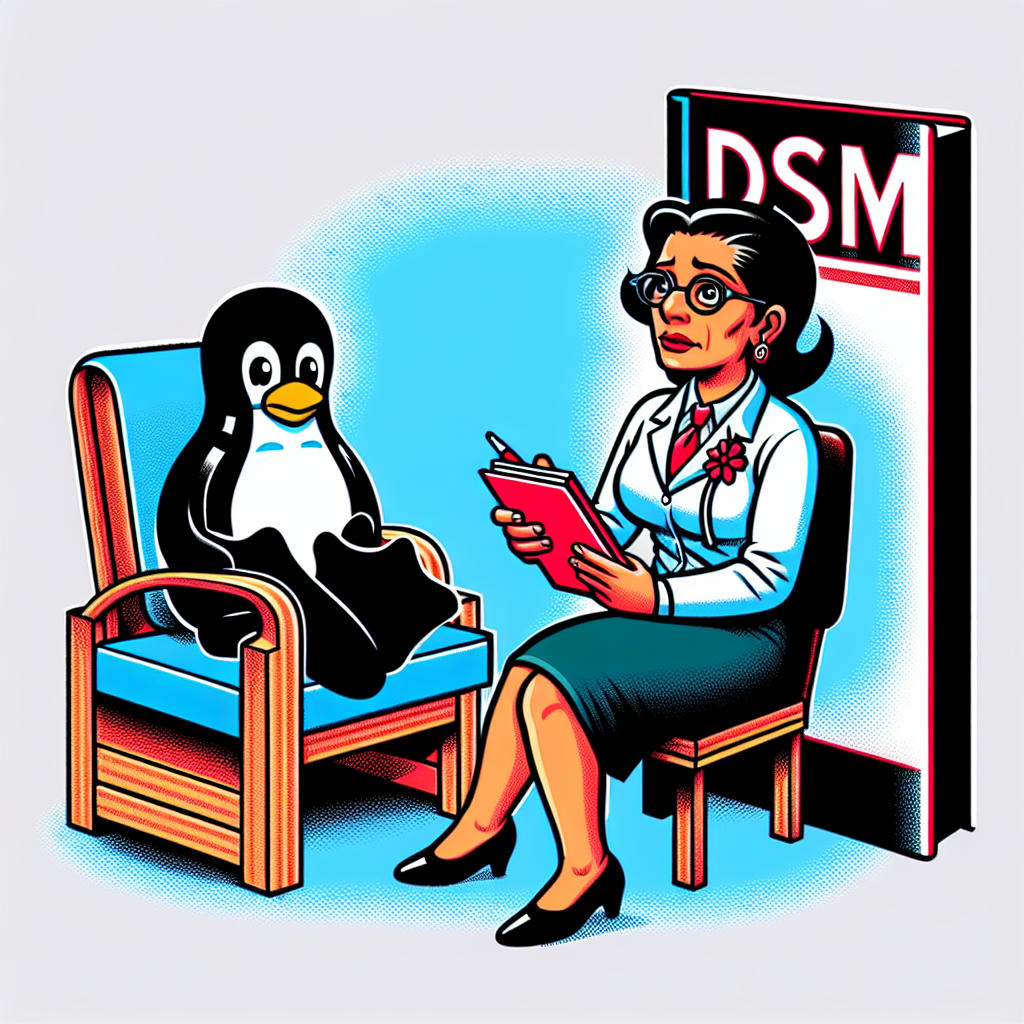Breaking News: Next DSM Edition to Classify 'Using Linux' as a Diagnostic Criterion
In a stunning turn of events that has sent shockwaves through both the psychiatric and computing communities, the next edition of the renowned Diagnostic and Statistical Manual of Mental Disorders (DSM) is rumored to include a truly modern condition: the persistent and exclusive use of Linux operating systems as a key diagnostic criterion for a newly recognized condition, tentatively named 'Tech Elitism Disorder.'
As per leaked sources - who refused to be named for fear of immediate backlash from the highly volatile Linux user base - this decision was driven by years of clinical research into behavioral patterns exhibited by individuals who demonstrate a 'profound and all-consuming preference for Linux over any other operating systems, to the point of developing superiority complexes and displaying symptoms of withdrawal when exposed to Windows or MacOS environments.'
Symptoms of Tech Elitism Disorder, as outlined in the draft, include but are not limited to: uncontrollable urges to customize every aspect of one's desktop environment, a pathological need to inform every technological conversation with the fact that they use Linux, and an inexplicable aversion to commercially popular software.
Moreover, the DSM's upcoming edition is said to include a comprehensive list of behaviors that could serve as early warning signs, such as spending more time discussing Linux on online forums than interacting with humans in real life, and crafting elaborate justifications for why gaming on Linux isn't as bad as people think.
In response to these startling revelations, several Linux communities have organized virtual sit-ins and peaceful protests within various IRC channels and GitHub repositories. 'This is outrageous and a blatant misunderstanding of our culture!' exclaimed one prominent Linux advocate, who wishes to remain anonymous. 'Next, they'll be saying our preference for the command line over graphical user interfaces is a symptom of antisocial personality disorder!'
The psychiatric community, however, maintains that this classification is merely an attempt to better understand the evolving nature of human-computer interactions in the 21st century. 'With the rise of technology, we've seen new forms of behavior emerge that we must study and classify in order to help those afflicted,' explained Dr. Technotica, a leading psychiatrist specializing in digital behavior disorders. 'By recognizing Tech Elitism Disorder, we're not pathologizing the use of Linux, but rather the extreme behaviors some individuals exhibit around it.'
To further complicate matters, there's a growing concern among psychiatric professionals that this new classification might inadvertently cause a spike in individuals proudly diagnosing themselves with Tech Elitism Disorder, as a badge of honor rather than a condition needing intervention. 'It's the Streisand effect in full force,' noted one psychologist, referencing the phenomenon where attempts to hide, remove, or censor information only serve to publicize it more widely.
Despite the controversies, the inclusion of 'Using Linux' as a criterion for diagnosing Tech Elitism Disorder in the next DSM could potentially open the doors to specialized therapeutic interventions designed specifically for the Linux-using demographic. From group therapy sessions held exclusively in terminal windows to cognitive behavioral therapies that involve gradually introducing elements of Windows GUI into their daily routines, the future of psychiatric treatment for this unique population appears both innovative and quirky.
As the mental health and tech communities await further developments with bated breath, one thing is clear: the intersection of psychiatry and personal computing is entering uncharted territories. Only time will tell how these new classifications will impact both those diagnosed with Tech Elitism Disorder and the broader Linux user community, but if nothing else, it promises to add a fascinating new layer to our understanding of the digital age.
